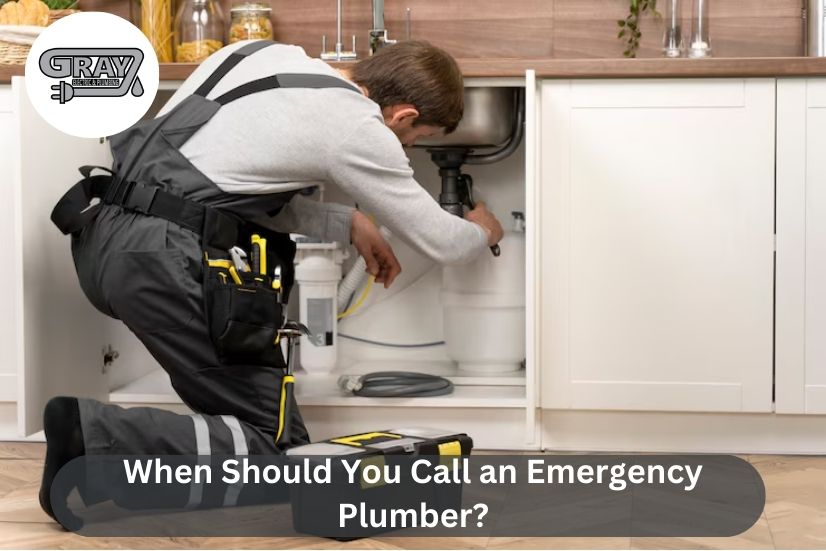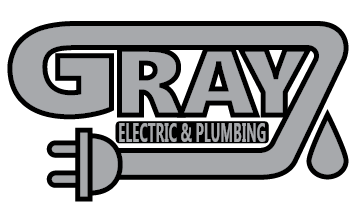Plumbing issues can arise unexpectedly, and knowing when to call an emergency plumber can prevent costly damage and keep your home safe. Sometimes, plumbing problems might feel like they can wait, but certain situations require immediate action. Let’s dive into when you should contact a professional emergency plumber and how to handle these situations effectively.

Burst Pipes: The Biggest Plumbing Emergency
A burst pipe is a plumbing emergency that requires fast action. When a pipe bursts, it can cause water to flood your home, damaging walls, floors, and furniture. This can lead to mold growth and structural issues. The cause of burst pipes can be many things, but freezing temperatures is the most common reason in cold climates like Anchorage, AK.
What to Do: If you notice a burst pipe or hear water rushing inside the walls, turn off your water supply immediately to prevent further damage. Don’t try to fix the pipe yourself, as this could make things worse. Instead, call an emergency plumber who has the tools and experience to stop the leak and replace the pipe safely.
Overflowing Toilets: Time to Call for Help
An overflowing toilet is more than just an inconvenience—it’s a sign of a serious plumbing issue. It could mean that your sewer system is blocked or there is a clog deep within the pipes. An overflowing toilet can quickly flood your bathroom and create unhygienic conditions.
What to Do: First, turn off the water supply to the toilet. This will stop more water from flowing and flooding the area. Then, call a professional emergency plumber who can safely assess the blockage and fix the problem. They have the right equipment, like drain snakes, to clear the clog without causing further damage.
Flooded Basement: Don’t Wait!
A flooded basement can be caused by a variety of issues, such as a broken pipe, a malfunctioning sump pump, or even heavy rain. Regardless of the cause, a flooded basement is a plumbing emergency that needs immediate attention to avoid water damage and potential mold growth.
What to Do: The first step is to stop the flow of water by turning off your water supply and sump pump if possible. Then, call an emergency plumber in Anchorage, AK, who can extract the water, locate the source of the flooding, and repair any damage. In severe cases, they might also recommend waterproofing solutions to prevent future flooding.
No Hot Water: It’s More Than Just an Inconvenience
If you wake up to no hot water, it can feel like a major inconvenience, especially in colder months. Whether you use hot water for showers, washing dishes, or laundry, it’s an essential part of your daily routine. While some minor issues can be fixed easily, other problems could be a sign of a more serious issue with your water heater.
What to Do: If your water heater stops working, you should call an emergency plumber to diagnose the issue. It could be a simple problem like a tripped breaker, or it might require replacing the heating element or thermostat. An emergency plumber will know how to fix the issue quickly and efficiently, so you can get back to normal.
Gas Leaks: Immediate Attention Needed
A gas leak is one of the most dangerous plumbing emergencies. Even small leaks can lead to fires or explosions, so it’s essential to act immediately. If you smell gas, leave your home right away and call a plumber who specializes in gas line repairs.
What to Do: Evacuate the house immediately, and avoid using any electrical appliances or switches. Call an emergency plumber who is qualified to handle gas leaks. They will locate the source of the leak, repair it, and ensure your home is safe. Gas line repairs should always be handled by a professional to avoid serious risks.
Water Heater Leaks: Act Fast to Avoid Water Damage
A leaking water heater is a common problem, but it can be a significant plumbing emergency. Water heaters typically last 10-15 years, but like any appliance, they can develop issues over time. A leak could be caused by rust, a malfunctioning valve, or a cracked tank.
What to Do: If you notice water pooling around your water heater or hear unusual sounds, call an emergency plumber immediately. They’ll be able to inspect the heater, fix the leak, and recommend whether a repair or replacement is needed. This quick action will prevent water damage to your floors and walls.
Sewer Backups: Don’t Let It Linger
A sewer backup is an urgent plumbing emergency. It occurs when the sewer system is blocked or overwhelmed, causing waste and water to back up into your home. The result can be a terrible odor, potential contamination, and severe plumbing issues.
What to Do: If you suspect a sewer backup, do not attempt to deal with it on your own. Call a professional emergency plumber who has specialized tools like sewer cameras to locate the blockage and clean out the pipes. If left untreated, a sewer backup can cause significant damage and health risks.
Clogged Drains: Don’t Let Small Issues Become Big Problems
A clogged drain may seem like a minor issue, but when ignored, it can lead to more serious problems. Over time, food debris, hair, soap scum, and grease can build up in your pipes and cause blockages. In some cases, a simple plunger won’t do the trick, and you’ll need the help of a professional emergency plumber.
What to Do: If a plunger doesn’t work, don’t try to force the clog out with harsh chemicals. Instead, call a professional emergency plumber who can safely remove the clog without damaging your pipes. Regular drain cleaning and maintenance can help prevent these types of issues.
Average Cost of an Emergency Plumber: What to Expect
You might be wondering about the cost of hiring an emergency plumber. While prices can vary depending on the location, severity of the problem, and time of day, it’s generally higher than a regular plumbing service due to the urgency and after-hours nature of the service.
What to Expect: Depending on the issue, the average cost of an emergency plumber can range from $150 to $500 or more. Rates may increase during holidays or weekends. It’s always a good idea to ask for a cost estimate before the work begins.
Slow Draining Water: Should You Wait or Call a Pro?
A slow-draining sink or shower might not seem like an emergency at first, but it’s a sign of a growing plumbing issue. Over time, slow drainage can lead to a complete blockage and cause water to back up into your home.
What to Do: While some slow drains can be fixed with a plunger or a drain cleaner, others may need professional help. A professional emergency plumber can inspect the pipes for deep blockages and clean them thoroughly, preventing further damage. Ignoring slow drainage can lead to bigger problems later.
Water Pressure Problems: When to Call for Help
Low water pressure is another plumbing issue that might seem minor but could signal a bigger problem. If you’re experiencing weak or uneven water pressure, it could be a sign of a leak, a broken valve, or a more complex issue within your plumbing system.
What to Do: If adjusting your faucets doesn’t improve the water pressure, it’s time to call an emergency plumber. They can identify the root cause of the problem, whether it’s a broken pipe or a clogged water filter, and restore your water pressure.
Conclusion
Knowing when you should call an emergency plumber is essential to protecting your home from serious damage. Whether it’s a burst pipe, gas leak, or flooded basement, don’t hesitate to call a professional emergency plumber for help. Prompt action can save you money and keep your home safe.
If you need an emergency plumber in Anchorage, AK, Gray Electric is here to provide fast, reliable service. Our professional plumbers are ready to assist with any plumbing emergency you face. Contact us today for expert help!
